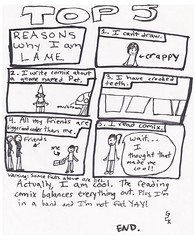The blogosphere is filled with lists. There are "top 5" lists, there are "top 10" lists. There the "best 3" lists and the "worst 3" lists. It seems that we are all destined to create list after list for our readers to stew over, comment on and discuss.
Most of the time these posts annoy me. I do not like the list. I am anti-list really (except when I need to organise myself). I think this comes from some strange desire to abolish lists and rules … a last dash of anarchy in a world of order. But then I read this post by Russell Davies and it gave me a new perspective.
It seems that I have the list all wrong … it is not trying to capture or define me, it is a way for me to define myself! Russell links to this GREAT site where you can order a T-shirt carrying your favourite list. Not only can you put your favourite Top 5 list on your blog, but you can now wear it as a T-shirt. So, if you are being truthful and dare to write a REAL Top 5 for your blog (you know, the kind where you TRUTHFULLY put forward a Top 5 that MATTERS to YOU) there is a chance to now wear your heart not on your sleeve, but on your chest. Cool!
So what would mine be? A little boring. Probably all about lists.
S
PS … and if you read Russell’s excellent post, I think Lego is cool … but Bionicle is waaay cool.




 It is hard to live up to your own idea of yourself. No matter what profession that we choose to follow, or path that we take in life, we can always fall into the trap of self censorship. On an artistic front we can hold back our best ideas or perhaps our "craziest" concepts, only to hear later that same idea pushed forward successfully. In business we can miss out on opportunities just because we did not step forward when the chance came … or we can suffer in our own failure because we did not ask for, or accept help, when it was needed. But, if you are nodding your head, then you are already a step ahead … you can at least recognise the situation.
It is hard to live up to your own idea of yourself. No matter what profession that we choose to follow, or path that we take in life, we can always fall into the trap of self censorship. On an artistic front we can hold back our best ideas or perhaps our "craziest" concepts, only to hear later that same idea pushed forward successfully. In business we can miss out on opportunities just because we did not step forward when the chance came … or we can suffer in our own failure because we did not ask for, or accept help, when it was needed. But, if you are nodding your head, then you are already a step ahead … you can at least recognise the situation.  When I sit down to write, most times the ideas just flow — I get into a groove, and the ideas begin to transform themselves quickly into words. This is partly because I write about the things that I am interested in, but also, partly because I have taken the time to develop my writing in a disciplined manner. In fact, I started writing this blog as a way of reasserting this discipline.
When I sit down to write, most times the ideas just flow — I get into a groove, and the ideas begin to transform themselves quickly into words. This is partly because I write about the things that I am interested in, but also, partly because I have taken the time to develop my writing in a disciplined manner. In fact, I started writing this blog as a way of reasserting this discipline.